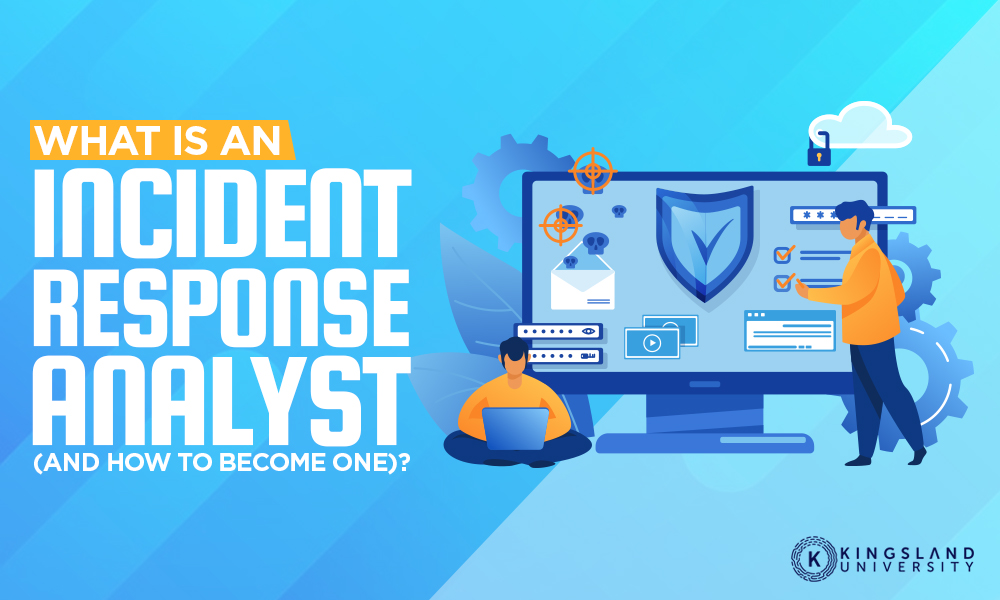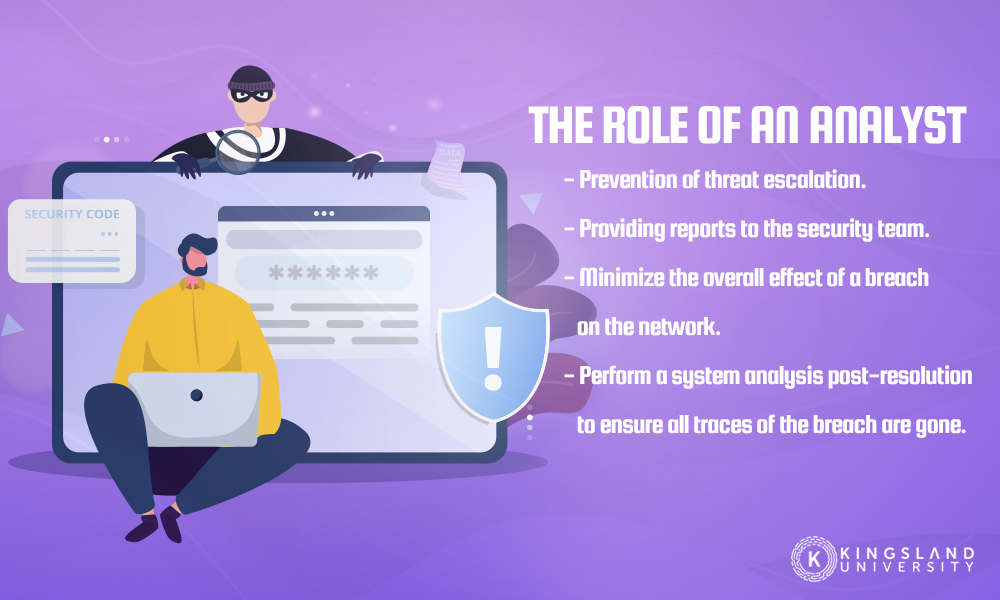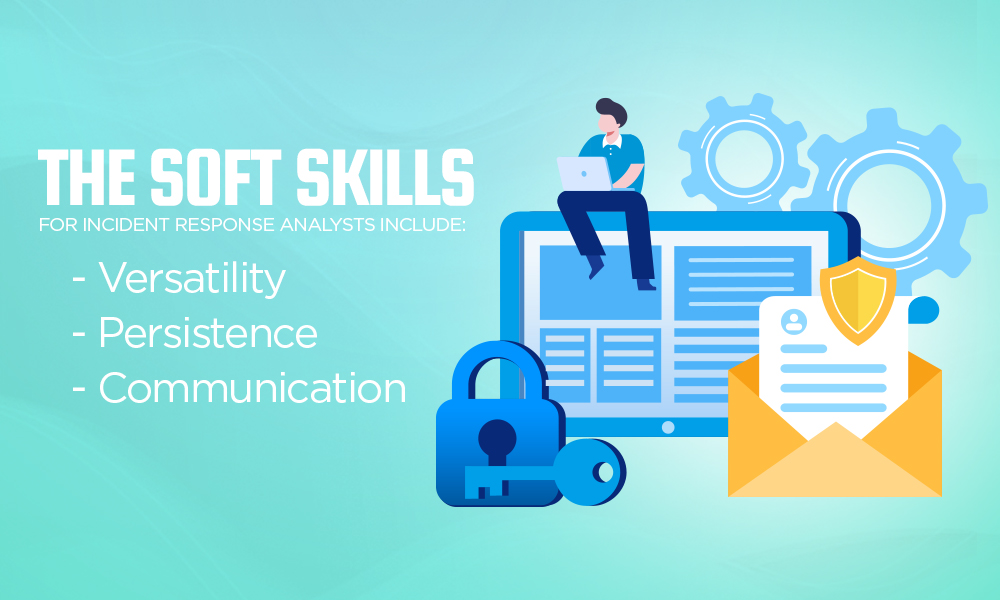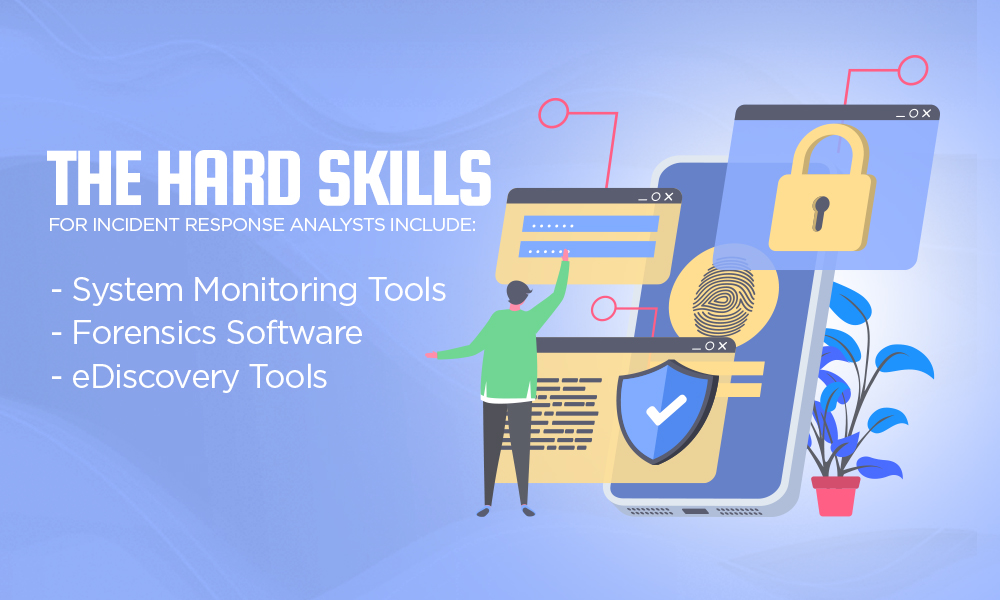
The world of cybersecurity is a field that is shifting and growing with every passing day, as more and more threats manifest themselves. Currently, the goal is to outright prevent threats from breaching systems at all and therefore resolve an issue before it exists. However, sometimes the measures put in place to prevent attacks are not always enough.
In cases where threats have successfully breached security, a line of defense is tasked with stemming the tide. To respond to the damage being inflicted on a system, there are incident response analysts who help guide the solution. With this article, we aim to help you better understand the role of an incident response analyst and how you might join their ranks.
What is an Incident Response Analyst?
An incident response analyst is not the sort of cybersecurity professional you call in to safeguard your system from threats preemptively. Instead, they are only called in when a breach has occurred, and you need to determine the best course of action to keep it from doing lasting damage. That is when you call-in your incident response analysts to cooperate with your team of responders.
The role of an analyst is designed to not directly handle the crisis at hand but to advise the first responders instead and keep things from escalating any further. The official responsibilities of an incident response analyst are:
- Prevention of threat escalation.
- Providing reports to the security team.
- Minimize the overall effect of a breach on the network.
- Perform a system analysis post-resolution to ensure all traces of the breach are gone.

The role of an incident response analyst essentially translates to emergency back-end maintenance of a network and has the potential to involve direct interaction with law enforcement. You also need to be able to perform risk assessments of a situation before deploying countermeasures to the threat at hand to ensure you will not simply exacerbate the issue to solve one of the symptoms. Incident response analysis is a high-pressure position that will require you to keep your cool under pressure due to the limited time you will be able to act.
Each of these responsibilities orients the incident response analyst to guide response teams to a rapid resolution of any potential breach while also ensuring the network is purged of the consequences of the breach. This allows network owners the opportunity to create patches in their security to attempt to prevent further breaches in the future.
While the role of an incident response analyst is defined, the arduous journey of actually becoming one might be less clear. It requires significant education in both cybersecurity and rapid response techniques.
Step 1: Education
One of the first steps required to become an incident response analyst is getting the proper education to ensure you have the basic skills necessary to operate in cybersecurity. The most popular and highly recommended form of education for those aspiring to become an incident response analyst is to pursue a university degree.
Ideally, seeking a bachelor’s or master’s degree in a computer-centric field is your best course of action. Certain degree plans are more effective in establishing yourself as a potential analyst, including computer forensics and cybersecurity degrees as an excellent starting point. As for some of the universities that are most helpful for this sort of thing:
- Southern New Hampshire University (SNHU): SNHU offers a degree program to get a Bachelor of Science degree in cybersecurity all from the comfort of your own home.
- Capella University (CU): Capella offers a degree program that will lead you to a Bachelor of Science degree in the field of information assurance and cybersecurity, once again via an online program allowing you to study from the location of your choice.
- Liberty University Online (LUO): Liberty is another online education provider that offers a degree plan in computer science with a focus on cybersecurity.
- Utica College (U): Utica is yet another online university that offers a degree plan that is perfect for aspiring incident response analysts. This school offers a program for network forensics and intrusion investigation, which has a great deal of relevance to the field.

While you might scoff at online universities, using them for a degree in cybersecurity fields is less of an impediment than you might believe. The school merely needs to be reputable and teach you what you need to know. That said, a degree is not necessarily the end-all for your professional aspirations, as other factors can help you gather the qualifications you need to break into the professional domain.
Step 2: Certifications
Like virtually all positions revolving around cybersecurity, additional education outside of a university setting is beneficial, if not outright mandatory, to gain a position. Completing this additional education yields certification in the skills you are educated on, making you a more appealing prospect to any potential employer. Certifications do more than just improve your odds of being hired as they reinforce your skillset with additional abilities and knowledge that will help you become a more effective analyst.

There are a select few that stand out as ideal for cybersecurity professionals and, by extension, incident response analysts when it comes to certifications. The first of these certifications is the Certified Reverse Engineering Analyst (CREA) certification. The CREA certification educated cybersecurity professionals and students on the skills they will need to reverse engineer malware used in the attacks being launched against a network. Understanding how malware works can be crucial in advising first response teams on how to tend to the breach your team is dealing with and assess how much of a risk your responses will create. The exam to get this certification is a 2-hour affair consisting of 50 questions. To successfully pass, you need to score a minimum of 70%.
Another important certification that is ideal for aspiring incident response analysts is the GAIC Certified Incident Handler (GCIH) certification. This certification is designed to help you cultivate an array of security skills that are excellent for increasing the odds of detecting security incidents as well as widening your ability to respond and resolve them. Having this understanding will grant you the ability to better direct the initial response team in neutralizing the threats as they arise and prevent further damage. Like the CREA certification, the GCIH certification requires the completion of a proctored examination. The GCIH certification exam is twice as long as the CREA, taking 4 hours to complete with anywhere between 100 to 150 total questions. Like the CREA certification exam, you require a 70% or greater to pass and earn your certificate.
Cybersecurity certifications, in many instances, can be a non-negotiable condition to be hired as a professional as they ensure you have the level of knowledge and understanding that is required to make you a viable member of their team. However, like university degrees, certifications are not everything.
Step 3: The Skillset
A reality of all positions, not simply those associated with cybersecurity, is that you need to have specific skills to function as a member of the team. While you might be thinking that the skills you need are exclusively technical, you would be wrong. In the realm of cybersecurity, you need a series of soft skills that are circumstantial from person to person and are impossible to teach due to their intuitive nature.
That is not to say you will not require the ‘hard’ skills of the position, which are easily taught to others due to their less circumstantial nature and consistency despite the practitioner. Merely that soft skills are just as necessary but harder to learn through formal education.
When it comes to becoming an incident response analyst, there are a few ‘soft’ skills that, while not necessarily mandatory, are highly prized among those vying for the position:
- Versatility: While this term might seem a bit generic, maintaining versatility in the field is a little clearer than you might expect. To succeed as an incident response analyst, you need to be able to adjust your plan of action as the situation develops instead of “shoving the square in the round hole,” so to speak. Maintaining flexibility and being able to adjust your approach will allow you to find solutions that might otherwise be overlooked.
- Persistence: Impossible to teach but vital for success; being able to keep on keeping on even as the situation becomes more chaotic is essential for cybersecurity professionals across the board. If you are willing to give up five minutes into a chaotic situation, you will be unable to effectively overcome the more intense attacks that might threaten your firm.
- Communication: The role of the incident response analyst is to guide the first response team to the resolution of a breach and clean up the mess. To advise a team, you need to be able to relay your intents and ideas to the team effectively. Moreover, you must do so clearly and concisely for them to react to your instruction rapidly.

‘Soft’ skills, by their very nature, are impossible to teach as they are tied to the type of person you are. You cannot teach someone to be more communicative or persistent if they are not open to that sort of behavior. That said, there also exist vital ‘hard’ skills that are technical and related to the field that can easily be taught to others. The hard skills for incident response analysts include:
- System Monitoring Tools: System monitoring tools are software programs that can oversee the activities of applications, root out performance issues, and identify errors. To serve as an effective incident response analyst, understanding these tools and what their results yield is vital for determining the next step in resolving the issues brought on from a network breach.
- Forensics Software: Forensics software are programs used to conduct analyses of digital media as it is running to ascertain where a program might have been exploited or what activities it has been used for. Incident response analysts use this software to find out where the breach might have occurred to work from that point to alleviate the issue and prevent a reoccurrence.
- eDiscovery Tools: eDiscovery tools are programs that allow for the tagging and review of electronically generated documents for legal proceedings. These tools can be used by incident response analysts if and when a breach gets submitted to a court of law to maintain the legal propriety of their intellectual property that might have been stolen.

These ‘hard’ skills are highly technical and are immutable in their details, making them easily taught to those with the technical aptitude to learning them. That is not to say that these are the only skills of value due to the highly expansive nature of cybersecurity. Many other vital skills exist for the field that can help you improve, even as an IRA. Mastering these ‘hard’ skills in conjunction with the more fluid ‘soft’ skills will allow one to become an expert incident response analyst and guide you on your way to becoming a well-establish professional.
The Final Byte

Becoming an incident response analyst is by no means an easy feat. Rather it is an arduous journey that requires a great deal of education and skill to complete. Between the degrees, certifications, and skills you will need to find employment in the field successfully, you might feel a little overwhelmed along the way.
Ultimately, becoming an incident response analyst will require dedication, and you will need to refine your ‘soft’ skills independently since they cannot be taught. Meanwhile, completing the other educational requirements and accumulating your ‘hard’ skills can all be done as you go. Fortunately, finding employment in the realm of cybersecurity, even as IRA, should not prove difficult once all is said and done. This field is one of the largest growing fields in the world, with one of the highest growth rates and employment shortages currently available.
What are your thoughts on incident response analysts? Have you discovered a newfound interest in this potential career path? It’s never too late to start, so why not get your foot in the door with our Cybersecurity Certification Program?


